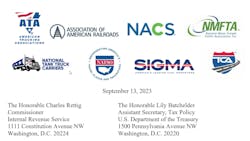Coalition urges agencies to ‘uphold Congressional intent’ on SAF tax credits
A coalition of transportation associations that includes National Tank Truck Carriers is calling on the federal government to “uphold Congressional intent” and subject sustainable aviation fuel (SAF) to more stringent lifecycle greenhouse gas (GHG) emissions modeling requirements under the 40B and 45Z tax credits enacted under the Inflation Reduction Act (IRA).
The coalition representing fuel retailers, distributors, and consumers of advanced renewable fuels includes the American Truck Associations, Truckload Carriers Association, and the National Association of Truckstop Operators (NATSO).
They argue in a letter to the Internal Revenue Service (IRS) and U.S. Department of the Treasury that the Carbon Offsetting and Reduction Scheme for International Aviation (CORSIA) modeling requirements for SAF are a fundamental underpinning of the statutory framework Congress created for biofuels within the IRA, which stipulates the value of a SAF tax credit depends upon the reduction of SAF lifecycle GHG emissions. Because renewable diesel and SAF utilize the same limited feedstocks, and renewable diesel is more efficient and environmentally compelling than SAF, Congress stipulated that SAF should only get a higher tax credit if it can meet higher environmental standards.
“Our organizations have repeatedly raised concerns that a higher tax credit amount for sustainable aviation fuel relative to other biofuels will siphon feedstocks away from over-the-road and rail use cases without any environmental justification for doing so,” the organizations argued. “Supply will diminish, and diesel prices will rise along with the price of all consumer goods that move by truck. Both the economy and the environment would be worse off.”
Inviting industry to disregard CORSIA would represent an affirmative decision by the Biden Administration to increase diesel emissions and increase fuel prices, the coalition continued. Without tax parity between SAF and other biofuels, SAF producers will threaten to siphon feedstocks away from those biofuels used in over-the-road transportation, potentially eliminating America's biodiesel and renewable diesel market.
SIGMA, the Association of American Railroads, and the National Association of Convenience Stores (NACS) also joined in the letter.
